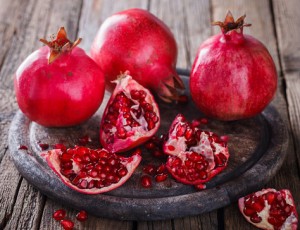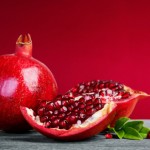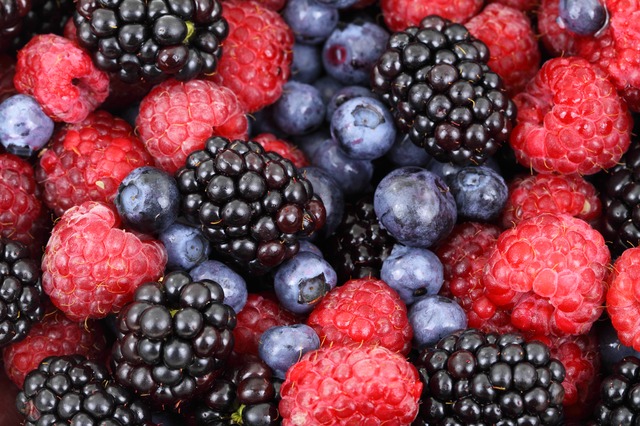10 health benefits of drinking pomegranate juice
 Getting all those seeds out of a pomegranate may seem like a lot of work, but it is worth it when you consider the many health benefits of drinking pomegranate juice.
Getting all those seeds out of a pomegranate may seem like a lot of work, but it is worth it when you consider the many health benefits of drinking pomegranate juice.
Pomegranate fruit was first discovered in Persia. It can be traced in historical documents as far back as 4,000 BC. Today, people around the world consume the fruit, and in recent years the pomegranate has become known for its high nutrient and antioxidant content.
For those who might not be as familiar with the pomegranate, it’s a round, red fruit with a tough outer layer. There are small, edible seeds inside that you can eat or make juice with. Fresh pomegranates are generally available in grocery stores from September through January.
Health benefits of drinking pomegranate juice
Pomegranates are a source of fiber, B vitamins, vitamin C, vitamin K, and potassium. Nutritionists estimate that a single pomegranate supplies one-quarter of a day’s worth of folate. This is a B vitamin that we need to synthesize and help repair our DNA. They say the fruit also supplies one-third of our daily vitamin C.
Let’s take a closer look at some of the health benefits of drinking pomegranate juice.
- Blood pressure: With blood pressure being one of the leading causes of heart attack and stroke, studies show that pomegranate juice nutrition is beneficial for those who suffer from hypertension. In one study, hypertensive participants experienced significant blood pressure reduction after consuming just 150 ml, that’s five ounces, of pomegranate juice daily for two weeks.
- Arthritis and joint pain: Although human studies still need to confirm the benefits, laboratory tests show that pomegranate extract can block enzymes that are known to cause damage to joints, especially the type of damage people with osteoarthritis experience. Many nutritional and medical experts say it makes sense since research also shows that some of the plant compounds found in the pomegranate have anti-inflammatory effects – and arthritis is an inflammatory disease.
- Heart disease: The main fatty acid in pomegranate juice is called punicic acid. Research indicates that it may help protect against heart disease. In a small study that involved people suffering from high cholesterol and triglycerides, 800 mg of pomegranate seed oil per day for four weeks was shown to lower triglycerides significantly and improve the triglyceride: HDL ratio. Another study showed significant reduction in LDL cholesterol in people with type 2 diabetes and high cholesterol when pomegranate juice was consumed.
- Memory: In a study involving surgical patients, two grams of pomegranate extract actually prevented memory deficit after the surgery. In another study involving 28 elderly people who suffered from memory problems, approximately 237 ml or eight ounces of pomegranate juice daily seemed to improve both visual and verbal memory. Animal studies also suggest that pomegranate may be able to help fight Alzheimer’s disease.
- Erectile dysfunction: More investigation is required, but research so far has shown that pomegranate juice increases blood flow and erectile response in rabbits. In a small study involving just over 50 men with erectile dysfunction, pomegranate juice appeared to have some benefit, but again much larger studies will need to be conducted to confirm the benefit in relation to erectile dysfunction.
- Anti-inflammatory effects: Inflammation is the catalyst for many fatal diseases. Research suggests that pomegranate contains anti-inflammatory properties that can reduce inflammation activity in the digestive tract. Studies also show that inflammatory activity in breast cancer and colon cancer cells may be impacted by the potent properties in pomegranate.
- Bacterial and fungal infections: Pomegranates and pomegranate juice have been known to benefit some types of bacteria and the yeast called Candida albicans. Some holistic experts believe the antibacterial and antifungal effects can protect us against mouth infections and inflammation, such as gingivitis.
- Exercise: There are pomegranate juice benefits for weight loss. Since the fruit is rich in dietary nitrates, which improves exercise performance, it encourages endurance, thus enabling some people to lose unwanted pounds. In one study, a group of athletes running on a treadmill were able to significantly enhance their blood flow and increase their exercise efficiency with just one gram of pomegranate extract taken 30 minutes before their run.
- Diabetes: Research shows that pomegranate juice benefits diabetes. A number of studies on the relationship between the bright red fruit and diabetes have been conducted. One study at the Jordon University of Science and Technology showed that a dose of pomegranate juice of 1.5 ml per kg of body weight was linked to a reduction in fasting glucose levels in type 2 diabetics. Reports published by the U.S National Library of Medicine suggest that antioxidants play a large role in how pomegranates help those with diabetes.
- Skin: For some time now, many beauticians have been saying pomegranate juice benefits skin. They might be right. A study published in Experimental Dermatology indicates that pomegranate juice can help protect skin from UVB damage, thanks to its antioxidant properties. Furthermore, some suspect pomegranate juice benefits acne. Since the fruit is rich in anthocyanins and hydrolysable tannins (antioxidant and anti-inflammatory properties), it protects the body from free radicals that can disrupt cell function. Our skin is exposed to free radicals such as pollution, food additives, pesticides, and cigarette smoke on a regular basis.
Healthy pomegranate juice recipes
 Now that you are familiar with the many benefits of this fruit, you might want to know how to make pomegranate juice.
Now that you are familiar with the many benefits of this fruit, you might want to know how to make pomegranate juice.
Simply cut off the top of the pomegranate fruit. This is the part of the fruit with the stem at the top. The next step is to cut the fruit in four sections. Place each of the sections into a bowl of water and using your fingers, roll the seeds out of the pomegranate membrane. Once you have all the seeds out, drain the water and dump the seeds into a juice extractor.
You can drink the juice just the way it is or try making any number of pomegranate juice recipes. There are a few below that you can consider…
Berry Happy
- 1 cup mixed berries (such as blueberries, raspberries, strawberries, blackberries)
- 1/4 cup pomegranate pips
- 1 apple or ripe pear, cut into wedges
Juice the berries, then the pomegranate seeds. Flush through with the apple.
Red and fruity
- 1/2 cup strawberries
- 1/2 cup pitted cherries
- 1 beet
- 1/4 cup pomegranate pips
- 1 apple, cut into wedges
Juice the strawberries and cherries, followed by the beet, pomegranate, and apple.
Pomegranate blue juice
- 1 cup pomegranate pips
- 2 cups blueberries
Juice the fruits all at once.
Not everyone is inclined to make their own juice, but if you want to enjoy the full benefits of pomegranate juice, you may want to consider 100 percent juice. This is juice that doesn’t have additives such as corn syrup or fructose in it. You might also want to think about organic juices that do not contain pesticides.
Making your own pomegranate juice can be much healthier and fun when you consider the fact that you can add other fruits as outlined in the recipes above. It is also important to keep in mind that drinking too much juice with added sugars could cause significant weight gain.
Juice cleanse health benefits, juicing diet recipes to detox your body at home
Juice cleanses can offer numerous health benefits, so if you’re trying to find a way to boost your health we have many juicing diet recipes that can help detox your body at home. But first, let’s sort out whether juice cleanses work and whether you should do a juice cleanse. Continue reading…
-
Low Gi Weightloss Plan
Low Gi Diet Weightloss Plan ? that can help you lose 19 pounds in 21 d
-
10 Ways To Maintain Your Healthy Weight
Losing weight takes discipline and time. I know, because it took me a
-
Exercise Burnout - Not A Factor With Isometrics
Any exercise program that requires you t
-
About FDA-approved Weight Loss Drugs
Obesity is a sickness that affects anyone at any age. According to rep
-
Snacks That Help You Lose Weight
A healthy snack can be an important part of a healthful
-
Losing Weight Naturally - How To Best Go About It…
Although the word diet is used in various contexts, actual dieting
- DON'T MISS
- New Types of Diets You Probably Haven’t Heard Of
- Top Weight Loss Techniques - Top Weight Loss Secrets
- Getting The Most Benefits From The Master Cleanse Lemonade Detox Diet
- How to Avoid Gaining Weight During the Winter Season
- How to find the best deep dish pizza
- Patient-doctor disconnect impacts weight loss interventions
- What Snacks and Meals A Low Carb Dieter Can Eat
- Employer offers dieters $20 monthly and a lottery to lose weight
- How to Avoid Holiday Weight Gain Without Dieting – 3 Super Simple Eating Modifications
- Intuitive Eating: Listening to Your Body’s Wisdom—No More Dieting!




